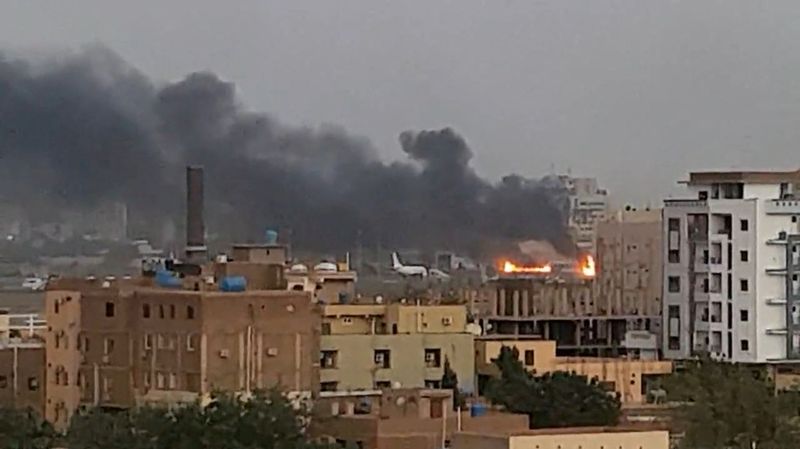By Aidan Lewis and Khalid Abdelaziz
KHARTOUM (Reuters) - Fighting has erupted in Sudan's capital Khartoum and at other sites across the country as powerful rival military factions battle for control, increasing the risk of a nationwide civil war.
WHAT TRIGGERED THE VIOLENCE?
Tension had been building for months between Sudan's army and the paramilitary Rapid Support Forces (RSF), which together toppled a civilian government in an October 2021 coup.
The friction was brought to a head by an internationally-backed plan to launch a new transition with civilian parties. A final deal was due to be signed earlier in April, on the fourth anniversary of the overthrow of long-ruling autocrat Omar al-Bashir in a popular uprising.
Both the army and the RSF were required to cede power under the plan and two issues proved particularly contentious: one was the timetable for the RSF to be integrated into the regular armed forces, the second was when the army would be formally placed under civilian oversight.
When fighting broke out on April 15, both sides blamed the other for provoking the violence. The army accused the RSF of illegal mobilisation in preceding days and the RSF, as it moved on key strategic sites in Khartoum, said the army had tried to seize full power in a plot with Bashir loyalists.
WHO ARE THE MAIN PLAYERS ON THE GROUND?
The protagonists in the power struggle are General Abdel Fattah al-Burhan, head of the army and leader of Sudan's ruling council since 2019, and his deputy on the council, RSF leader General Mohamed Hamdan Dagalo, commonly known as Hemedti.
As the plan for a new transition developed, Hemedti aligned himself more closely with civilian parties from a coalition, the Forces for Freedom and Change (FFC), that shared power with the military between Bashir's overthrow and the 2021 coup.
Diplomats and analysts said this was part of a strategy by Hemedti to transform himself into a statesman. Both the FFC and Hemedti, who grew wealthy through gold mining and other ventures, stressed the need to sideline Islamist-leaning Bashir loyalists and veterans who had regained a foothold following the coup and have deep roots in the army.
Along with some pro-army rebel factions that benefited from a 2020 peace deal, the Bashir loyalists opposed the deal for a new transition.
WHAT'S AT STAKE?
The popular uprising had raised hopes that Sudan and its population of 46 million could emerge from decades of autocracy, internal conflict and economic isolation under Bashir.
Conflict could not only destroy those hopes but destabilise a volatile region bordering the Sahel, the Red Sea and the Horn of Africa.
It could also play into competition for influence in the region between Russia and the United States, and between regional powers who have courted different actors in Sudan.
WHAT'S THE ROLE OF INTERNATIONAL ACTORS?
Western powers including the United States had swung behind a transition towards democratic elections following Bashir's overthrow. They suspended financial support following the coup, then backed the plan for a new transition and a civilian government.
Energy-rich powers Saudi Arabia and the United Arab Emirates have also sought to shape events in Sudan, seeing the transition away from Bashir's rule as a way to roll back Islamist influence and bolster stability in the region.
Gulf states have pursued investments in sectors including agriculture, where Sudan holds vast potential, and ports on Sudan's Red Sea coast.
Russia has been seeking to build a naval base on the Red Sea, while several UAE companies have been signing up to invest, with one UAE consortium inking a preliminary deal to build and operate a port and another UAE-based airline agreeing with a Sudanese partner to create a new low-cost carrier based in Khartoum.
Burhan and Hemedti both developed close ties to Saudi Arabia after sending troops to participate in the Saudi-led operation in Yemen. Hemedti has struck up relations with other foreign powers including the UAE and Russia.
Egypt, itself ruled by military man President Abdel Fattah al-Sisi who overthrew his Islamist predecessor, has deep ties to Burhan and the army, and recently promoted a parallel track of political negotiations through parties with stronger links to the army and to Bashir's former government.
WHAT ARE THE SCENARIOS?
International parties have called for a ceasefire and a return to dialogue, but there has been little sign of compromise from the warring factions.
The army has branded the RSF as a rebel force and demanded its dissolution, while Hemedti has called Burhan a criminal and blamed him for visiting destruction on the country.
Though Sudan's army has superior resources including air power and the RSF expanded into a force estimated at 100,000 men that had deployed across Khartoum and its neighbouring cities as well as in other regions, raising the spectre of protracted conflict on top of a long-running economic crisis and existing, large-scale humanitarian needs.
The RSF can also draw on support and tribal ties in the western region of Darfur, where it emerged from the militias that fought alongside government forces to crush rebels in a brutal war that escalated after 2003.
